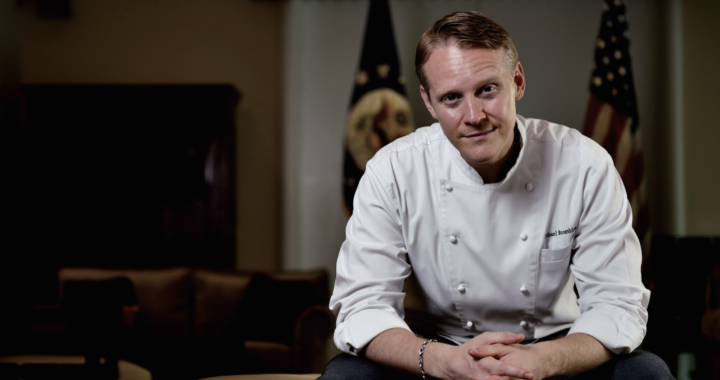罗朗的英文名字是Michael D. Rosenblum,人们都叫他Michael,他的中文名字叫罗朗,来源于他的姓Rosenblum中的“Ro”和“lum”。目前他在广州开了一家中餐厅,餐厅取名“朗泮轩”,“朗”代表他自己,“泮”是水边的意思,按照中国的哲学,罗朗命运中缺“水”,他相信为餐厅取这个名字,会给他带来好运。
罗朗喜欢关于中国文化的一切。朗泮轩里放着中国各地的茶叶,到这里喝下午茶,几乎可以喝到全中国的茶叶。他会把中式旧家具当宝贝,用来做餐厅里的餐桌和椅子;客人们在朗泮轩用到的餐具,有可能是几百年前的,也有可能是上千年前的,都充满了艺术美感。到了朗泮轩,你需要放慢脚步,需要安静下来,要与历史、与文化、与食物对话,而不只是吃一顿饭。
罗朗喜欢中国文化和中国美食,这和他的人生经历有关。小的时候,他在学校里受到了欺负,为了让他学会保护自己,父亲建议他学习中国功夫,他一下子就着迷了。在练功夫的地方,他喝到了中国茶,从此他就对茶上瘾了。他14岁到美国唐人街的中国餐馆打工,接触到了中餐后,他决定中学一毕业就到上海学中文,学各种厨艺。
罗朗在美国大使馆、顶级酒店、主题餐厅都工作过,但是做有灵魂的菜,开有自己风格的中餐厅,才是他想要做的事情。如何做出有灵魂的菜呢?罗朗决定向中国各地的老百姓学习,2010年,罗朗开始了他在中国的旅行。他去了很多地方,跟当地的老师傅学传统厨艺。有一次,为了学做一种美食,他每天都站在一家饭店门外,坚持了一个月,最后他的真诚感动了老板,他学到了做这种美食的技术。
吃罗朗的菜,如果不了解罗朗,还真吃不懂他的菜,这是因为罗朗的每一道菜,都有故事,都有他的思考和感情。有一年,罗朗骑自行车去兰州和青海,然后又坐火车去了新疆,在火车上他站了40多个小时,到了他向往的城市——喀什。不巧的是,到喀什的那天傍晚,又累又饿的罗朗出来找吃的,却碰到了当地人的斋戒,所有的餐厅都关门了,最后有一家人请他吃了晚饭,这顿晚饭是羊肉串、手抓饭、馕和酸奶。罗朗根据当时吃的菜做了一道叫“喀什之夜”的菜,做菜的时候,他用上了真情,这道菜怎么会不好吃呢!
Michael D. Rosenblum, known to everyone as Michael, has a Chinese name, Luo Lang, which is derived from the “Ro” and “lum” in his surname, Rosenblum. He currently owns a Chinese restaurant in Guangzhou named “Lang Pan Xuan,” where “Lang” represents himself, and “Pan” means by the water. According to Chinese philosophy, Luo Lang believes that he lacks “water” in his destiny, and he is confident that naming his restaurant this way will bring him good fortune.
Luo Lang is passionate about all things related to Chinese culture. Lang Pan Xuan is filled with a variety of teas from all over China, allowing visitors to enjoy an afternoon tea that encompasses the flavors of the entire country. He treasures Chinese antique furniture, using it as tables and chairs in his restaurant. The utensils that guests use at Lang Pan Xuan could be hundreds or even thousands of years old, all imbued with artistic beauty. When you arrive at Lang Pan Xuan, you are encouraged to slow down, quiet your mind, and engage in a dialogue with history, culture, and food, rather than just eating a meal.
Luo Lang’s love for Chinese culture and cuisine is related to his life experiences. As a child, he was bullied at school, and his father suggested he learn Chinese martial arts to defend himself. He became instantly fascinated. It was while practicing martial arts that he first tasted Chinese tea, and he has been hooked ever since. At the age of 14, he began working at a Chinese restaurant in Chinatown, New York, and after being exposed to Chinese cuisine, he decided to study Chinese and various culinary arts in Shanghai as soon as he graduated from high school.
Luo Lang has worked at the American embassy, top hotels, and themed restaurants, but creating soulful dishes and running a Chinese restaurant with his own style is what he truly desires. How does one create soulful dishes? Luo Lang decided to learn from the common people across China, and in 2010, he embarked on a journey throughout the country. He visited many places and learned traditional culinary skills from local masters. On one occasion, to learn how to make a particular dish, he stood outside a restaurant every day for a month. His sincerity eventually moved the owner, and he was taught the technique to make this dish.
If you do not understand Luo Lang, you may not truly appreciate his dishes, as each of his creations has a story, his thoughts, and emotions behind it. One year, Luo Lang cycled to Lanzhou and Qinghai, then took a train to Xinjiang, standing for over 40 hours on the train to reach the city he longed for – Kashgar. Unfortunately, upon arriving in Kashgar in the evening, tired and hungry, he found that all the restaurants were closed due to a local fast. Eventually, a local family invited him to dinner, which consisted of lamb skewers, hand-grabbed rice, nang (a type of bread), and yogurt. Based on the meal he had that night, Luo Lang created a dish called “Kashgar Night,” infusing it with genuine emotion. How could such a dish not be delicious?


